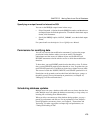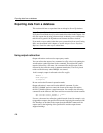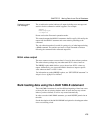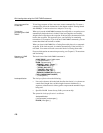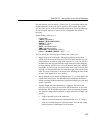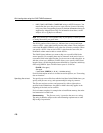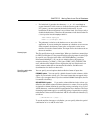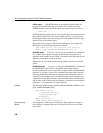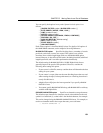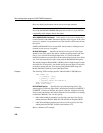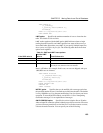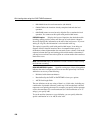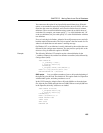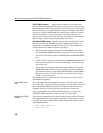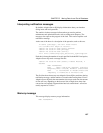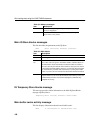
CHAPTER 5 Moving Data In and Out of Databases
181
You can specify load options in any order. Syntax for load-options is as
follows:
[ { BLOCK FACTOR
number
| BLOCK SIZE
number
} ]
... [ BYTE ORDER { NATIVE | HIGH | LOW } ]
... [ LIMIT
number-of-rows
]
... [ NOTIFY
number-of-rows
]
... [ ON FILE ERROR { ROLLBACK | FINISH | CONTINUE} ]
... [ PREVIEW { ON | OFF } ]
... [ ROW DELIMITED BY ’
delimiter-string
’ ]
... [ SKIP
number-of-rows
]
... [ START ROW ID
number
]
... [ UNLOAD FORMAT ]
Each of these options is described briefly below. For details of all options of
the
LOAD TABLE statement, see the Adaptive Server IQ Reference.
BLOCK FACTOR option Specifies blocking factor, or number of records
per block, used when a source was created. This option is not valid for
insertions from variable length input fields; use the
BLOCK SIZE option
instead. However, it does affect all file inserts (including from disk) with fixed
length input fields, and it can affect performance dramatically.
The default setting for
BLOCK FACTOR is 10,000. Higher block factors
generally improve the speed of I/O operations. However, consider the
following when setting this option:
• If your source is a disk file, memory considerations will determine the best
setting for your system.
• If your source is a tape, either use the same blocking factor that was used
when creating the tape (for best performance) or a blocking factor that is
evenly divisible into it.
• Adaptive Server IQ rejects the insert operation if you specify a
BLOCK
FACTOR
of zero.
• You cannot specify
BLOCK FACTOR along with BLOCK SIZE or with any
variable-width input fields.
ESCAPE CHARACTER option Specifies an alternative escape character.
The default escape character for characters stored as hexadecimal codes and
symbols is a backslash (\), so that \x0A is the linefeed character, for example.
This can be changed using the
ESCAPE CHARACTER clause. For example, to
use the exclamation mark as the escape character, you would enter:
... ESCAPE CHARACTER ’!’



